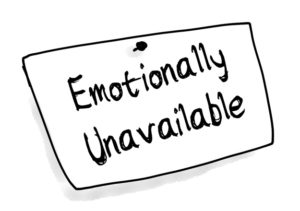 Emotional unavailability refers to the inability of a person to share feelings with another person. It helps to understand that emotionally unavailable people rarely choose to be that way. It’s an unconscious defense, perhaps against trauma or some other past emotional wounds.
Emotional unavailability refers to the inability of a person to share feelings with another person. It helps to understand that emotionally unavailable people rarely choose to be that way. It’s an unconscious defense, perhaps against trauma or some other past emotional wounds.
When we commit to a relationship, we usually expect that our partner will reciprocate the same level of emotional involvement. Many of us hope to find a soulmate, who can share and understand our feelings and ways of thinking on an intensely personal level. Others don’t expect such an intense level of involvement. They feel more comfortable maintaining personal privacy within a more boundaried relationship. Conflicts may arise when the two partners differ in their expectations of how close they should become. One partner may feel emotionally stranded, feeling abandoned and craving more closeness. The other partner may feel smothered or pressured into providing more of his or her emotional self than can possibly be given.
How to Turn Emotional Unavailability into Emotionally Available
Since people connect through their feelings, one who is out of touch with the emotional realm leads a lonely and isolated life, unable to engage in the process of nurturance and trust that can be found within a healthier relationship. Fortunately, this condition is correctable.
We learn about emotions starting in childhood, and we continually refine our relationship with our emotions throughout our lives. During adulthood, we learn subtler versions of our basic childhood emotions. Then we continue to learn how to define them, categorize them, and express them appropriately throughout our development.
In addition to becoming familiar with your emotions, there are three other elements that are related to developing the capacity to be emotionally available:
- Good self-esteem
- Healthy boundaries
- The ability to trust
